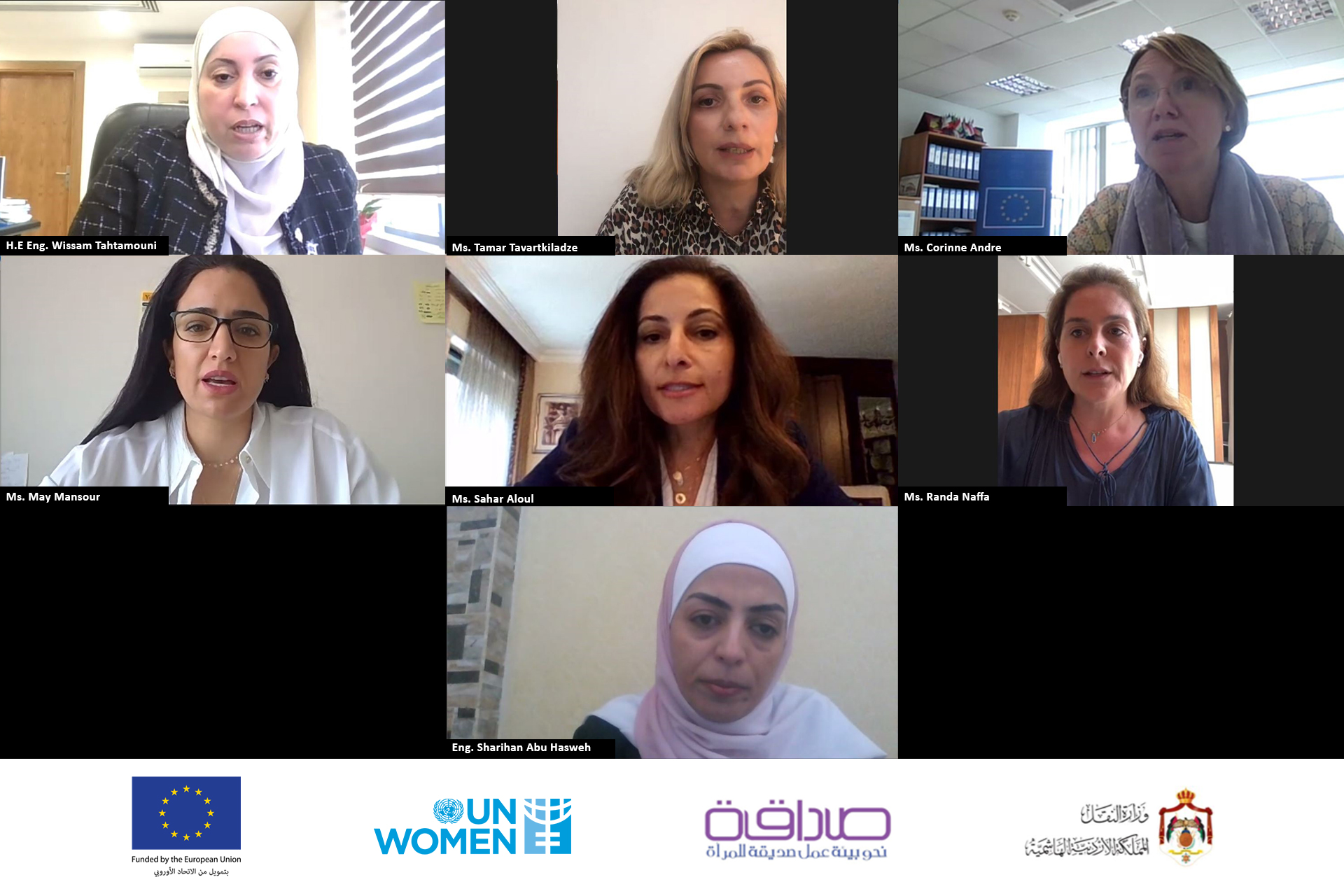National Framework for Gender Sensitive Public Transport Launched
Date:

To address barriers that hold back women’s economic empowerment and participation in the labor market, SADAQA and the Ministry of Transport, in cooperation with the European Union Delegation to Jordan and UN Women under the EU regional Trust Fund in response to the Syrian crisis, officially launched on Monday the National Framework for Gender Sensitive Public Transport that aims to enhance reliability, safety and accessibility of public transport for women.
The virtual launch was held under the patronage of the Secretary General of the Ministry of Transport H.E. Eng. Wissam Tahtamouni, and was attended by the main national and international partners working on public transportation and women’s empowerment in Jordan.
Participants underscored the importance of the Framework, which provides a solid “road-map” to guide national efforts in promoting gender-responsive solutions for improving public transport.
“At this time where the world is confronted with a harsh economic reality, it is imperative that we start to think about solutions to support women’s access to economic opportunities through improved mobility, and by ensuring safer and more affordable public transport,” said the Secretary General of the Ministry of Transport H.E. Eng. Wissam Tahtamouni.
Lack of and inaccessibility to safe and reliable transportation are considered as one of the three main structural barriers impacting women’s access to the labor market, along with limited availability of childcare services and pay inequity.
“Based on the main recommendations of our study to mainstream gender policies into public transportation, it was essential that we developed a framework for public transportation applying gender and social lens, that would encompass all national efforts in this field, while taking into account women’s needs during mobility,” said SADAQA Core Team member, Ms. Randa Naffa.
The National Framework for Gender Sensitive Transportation covers the legal reforms needed to improve women’s mobility and access to the public transport system, as well as key elements to mainstream gender in all major infrastructure and planning works in this field. The Framework also provides guidance on those elements needed to foster an enabling working environment to attract and retain women in this sector and to increase their representation, while raising the capacity of employees, operators and stakeholders.
According to Head of Cooperation at the EU Delegation to Jordan, Ms. Corinne André “Gender equality and women empowerment are at the heart of EU cooperation programmes, especially in crisis contexts. In Jordan, economic empowerment has been a prominent and imperative aspect of many of the programmes we fund, in particular under the EU regional Trust Fund in response to the Syrian crisis, covering the needs of the most vulnerable as well the needs of refugees. We are convinced that safe transportation for women is an essential prerequisite for achieving this goal.”
The Framework was developed using a participatory approach during a series of multi-stakeholder workshops engaging government representatives, mobility experts, legislators, national and international partners, such as professional associations, the Land Transport Regulatory Commission, the Greater Amman Municipality, and the Traffic Department.
“Innovative and community-led transportation solutions contribute to reducing gender barriers to mobility, while opening opportunities to jobs for women in the transport sector. Revising the transport systems with gender lens will make them more resilient and inclusive, this increasing economic growth potential at the local level” said Tamar Tavartkiladze on behalf of UN Women.
As part of its commitment to integrate gender perspectives into policy reforms, the Ministry of Transport signed a Memorandum of Understanding with SADAQA to implement the National Framework for Gender Sensitive Public Transport, as well as other measures aimed at improving women’s mobility. The Ministry is also working on operationalizing a code of conduct for passengers, drivers and operators in the public transport system developed in partnership with the World Bank under the Mashreq Gender Facility, which also includes a dedicated app to report violations.
Available in Arabic here.